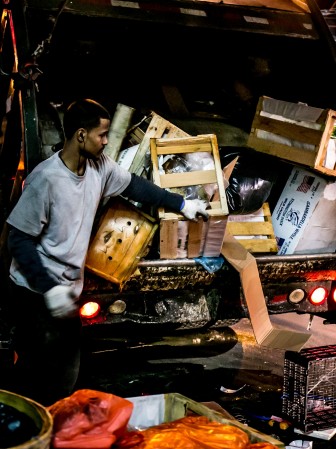
Adi Talwar
Commercial waste haulers at work late one night in May 2015.
I started working in private sanitation five years ago. Little did I know that this is one of the hardest and most dangerous jobs there is.
In New York City, all commercial waste is picked up by private carters, unlike residential waste which is picked up by the Department of Sanitation. There are over 90 private carters in the city, driving all over the five boroughs every night, picking up trash everywhere from the corner bodega to the Empire State Building.
I worked for a company in Brooklyn called Viking Sanitation as a “helper,” the people who ride on the back of the truck and grab the trash at each stop. Every night, we picked up trash all over the borough – Avenue U and Bay Parkway, then up to Fulton Street, downtown Brooklyn, and after that we’d go to Bay Ridge and finish up there. On a busy night we would make upwards of 300 stops and pick up 30-35 tons of trash.
Viking paid $120 per shift. Some companies pay even less. Because we got paid a flat rate we worked as fast as we could, killing our bodies and endangering everyone else on the road in the process. I had to hold on for dear life so I wouldn’t get thrown off the truck. My co-worker lost his grasp once and fell off the moving truck into the street. He ended up in the hospital with an arm injury, but was back at work for his next shift. None of us had health insurance. I was given no safety equipment to do the job. No boots, no gloves, no uniform. Nothing.
There’s all kinds of stuff in the trash. A lot of companies don’t recycle, so I’d be getting my legs cut up with broken bottles. We even had to pick up medical waste at an old age home – my co-worker saw a syringe in the trash. It’s illegal for these companies to pick up hazardous waste, but they do it anyway.
It doesn’t have to be this way. We know that companies with unions have better working conditions. Some cities have even re-organized the whole system so that commercial waste is collected by zone, meaning one carter will cover a certain area, instead of having trucks driving all over the city. The City Council is about to consider a bill to do the same thing here, and if they do it right, the policy can really help protect those of us on the trucks.
We tried changing things on our own at Viking by starting a union. When the boss found out, he started calling the workers one by one into his office, bribing us with a little extra money so that we wouldn’t vote in the Teamsters. A lot of people got scared. I kept supporting the union and the boss reduced my hours in retaliation.
Lucky for me, the Teamsters were able to get me a job at a union sanitation company. I make $24 an hour and I work eight hours a night. They give me everything I need to do my job. I have good healthcare and a retirement plan. I can take time off when I am sick. It’s the first job where I ever got to take a vacation.
Above all, I am treated with respect, like a human being. Every sanitation worker in New York City deserves to be treated like this.
When the City Council passes the commercial waste zone bill, they should put the interests of workers first. If there is only one carter in every zone, we won’t have to race between stops. They should require that every company pay a fair wage and provide safety equipment and training, and protect whistleblowers so we can stand up for our rights and keep our jobs. When it comes to hiring for these newly good jobs, they should prioritize the black and brown communities who have been risking our lives for years in this industry.
Give the workers who pick up your trash every night the respect they deserve.
Anthony Carmona is a private sanitation worker at Waste Connections in the Bronx.









One thought on “Opinion: NYC Must Keep Workers in Mind as it Revamps Commercial-Waste System”
Pingback: Politico And City Limits Highlight Our Ongoing Efforts To Reform NYC Waste Industry - New York Lawyers for the Public Interest